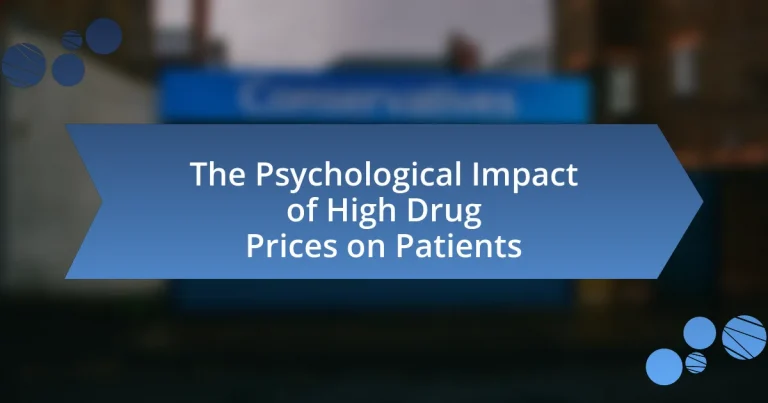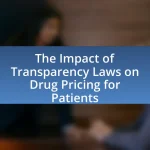The article examines the psychological impact of high drug prices on patients, highlighting how financial strain leads to increased anxiety, depression, and feelings of helplessness. It discusses the correlation between medication costs and mental health outcomes, revealing that many patients skip medications due to affordability issues, which exacerbates their health conditions. The article also explores coping strategies, emotional responses, and the role of healthcare providers in supporting patients facing these challenges, emphasizing the need for financial assistance programs and open communication to mitigate the psychological burden associated with high drug prices.
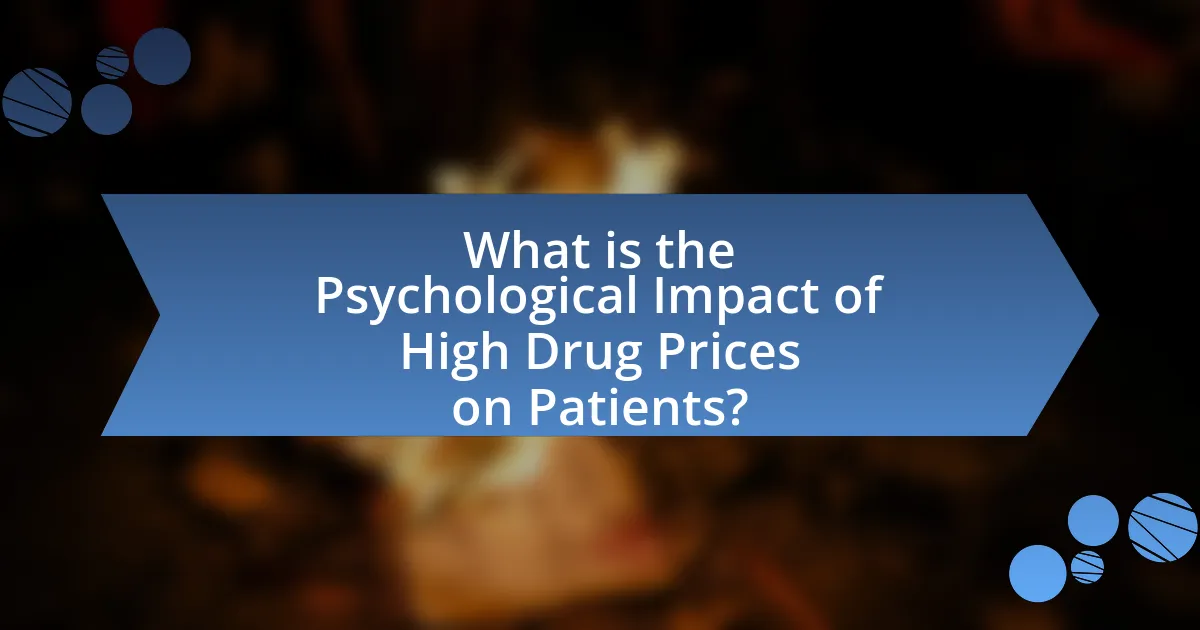
What is the Psychological Impact of High Drug Prices on Patients?
High drug prices significantly contribute to psychological distress among patients, leading to feelings of anxiety, depression, and helplessness. Research indicates that when patients face high medication costs, they often experience increased stress levels due to financial strain and the fear of not being able to afford necessary treatments. A study published in the Journal of General Internal Medicine found that nearly 25% of patients reported skipping medications due to cost, which exacerbates their health issues and contributes to a cycle of worry and despair. Furthermore, the inability to access medications can lead to a diminished quality of life, as patients may feel trapped in their health conditions without viable solutions.
How do high drug prices affect patients’ mental health?
High drug prices negatively impact patients’ mental health by increasing stress and anxiety related to financial burdens. Patients often experience feelings of helplessness and depression when they cannot afford necessary medications, leading to a decline in overall well-being. A study published in the Journal of Health Economics found that individuals facing high out-of-pocket costs for medications reported significantly higher levels of psychological distress compared to those with lower costs. This correlation highlights the direct link between the affordability of medications and mental health outcomes, emphasizing that financial strain from high drug prices can exacerbate existing mental health issues or contribute to new ones.
What specific psychological conditions are exacerbated by high drug prices?
High drug prices exacerbate specific psychological conditions such as anxiety, depression, and stress. Patients facing unaffordable medication costs often experience heightened anxiety due to the fear of not being able to manage their health conditions effectively. This financial burden can lead to increased depressive symptoms, as individuals may feel hopeless about their ability to access necessary treatments. Additionally, the stress associated with navigating high drug prices can contribute to overall mental health deterioration, as evidenced by studies indicating that financial strain is a significant predictor of psychological distress.
How do patients cope with the stress of high drug costs?
Patients cope with the stress of high drug costs through various strategies, including seeking financial assistance, utilizing generic alternatives, and engaging in open communication with healthcare providers. Financial assistance programs, often provided by pharmaceutical companies or non-profit organizations, help alleviate the burden of costs for many patients. A study by the Kaiser Family Foundation found that nearly 30% of patients reported using generic medications as a cost-saving measure, which can significantly reduce expenses. Additionally, patients frequently discuss their financial concerns with healthcare providers, who may offer alternative treatment options or resources to manage costs effectively.
What are the emotional responses of patients facing high drug prices?
Patients facing high drug prices often experience feelings of anxiety, frustration, and helplessness. These emotional responses stem from the stress of financial burden and the fear of not being able to afford necessary medications. Research indicates that approximately 25% of patients report skipping doses or not filling prescriptions due to cost concerns, which exacerbates feelings of worry about their health outcomes. Additionally, the emotional toll can lead to increased depression and a sense of isolation, as patients may feel unsupported in their struggles with affordability.
How does anxiety manifest in patients unable to afford medications?
Anxiety in patients unable to afford medications often manifests as heightened stress, worry about health outcomes, and feelings of helplessness. These individuals may experience physical symptoms such as increased heart rate, insomnia, and gastrointestinal issues, which are common manifestations of anxiety disorders. Research indicates that financial strain significantly correlates with mental health issues; for instance, a study published in the American Journal of Psychiatry found that individuals facing financial hardship are more likely to report anxiety and depression symptoms. This relationship underscores the psychological toll that high drug prices can impose on patients, leading to a cycle of anxiety that exacerbates their overall health condition.
What role does depression play in the experience of high drug prices?
Depression significantly exacerbates the experience of high drug prices by increasing the perceived burden of medication costs and reducing the likelihood of adherence to treatment. Individuals suffering from depression often experience feelings of hopelessness and helplessness, which can lead to a diminished capacity to manage healthcare expenses effectively. Research indicates that patients with depression are more likely to forgo necessary medications due to financial constraints, as highlighted in a study published in the Journal of Clinical Psychiatry, which found that 30% of depressed patients reported skipping doses or not filling prescriptions due to cost concerns. This interplay between depression and high drug prices creates a cycle where untreated mental health issues can lead to worsening physical health, further increasing healthcare costs and complicating the management of both conditions.
Why do high drug prices lead to feelings of helplessness among patients?
High drug prices lead to feelings of helplessness among patients because they create financial barriers that prevent access to necessary medications. When patients cannot afford their prescriptions, they may experience anxiety, stress, and a sense of loss of control over their health. According to a 2021 survey by the Kaiser Family Foundation, nearly 30% of Americans reported not filling a prescription due to cost, highlighting the direct correlation between high prices and patients’ inability to manage their health effectively. This financial strain can exacerbate feelings of vulnerability and despair, as patients may feel that their health outcomes are dictated by their economic situation rather than their medical needs.
How does the perception of unfairness contribute to psychological distress?
The perception of unfairness significantly contributes to psychological distress by creating feelings of anger, frustration, and helplessness. When individuals perceive that they are being treated unfairly, particularly in contexts such as high drug prices, it can lead to increased stress and anxiety. Research indicates that perceived injustice is linked to negative emotional outcomes, as individuals often feel powerless to change their circumstances. A study published in the Journal of Health Psychology found that patients facing high drug costs reported higher levels of emotional distress, attributing their feelings to perceived inequities in access to necessary medications. This emotional turmoil can exacerbate existing health issues and diminish overall well-being, illustrating the profound impact of perceived unfairness on mental health.
What impact does stigma have on patients struggling with drug affordability?
Stigma significantly exacerbates the challenges faced by patients struggling with drug affordability. Patients often experience feelings of shame and isolation, which can deter them from seeking necessary medical care or discussing their financial difficulties with healthcare providers. Research indicates that stigma can lead to increased psychological distress, resulting in poorer health outcomes and a reluctance to adhere to prescribed treatments. A study published in the Journal of Health and Social Behavior found that individuals facing stigma related to their financial situation were more likely to report negative mental health effects, further complicating their ability to manage their health effectively.
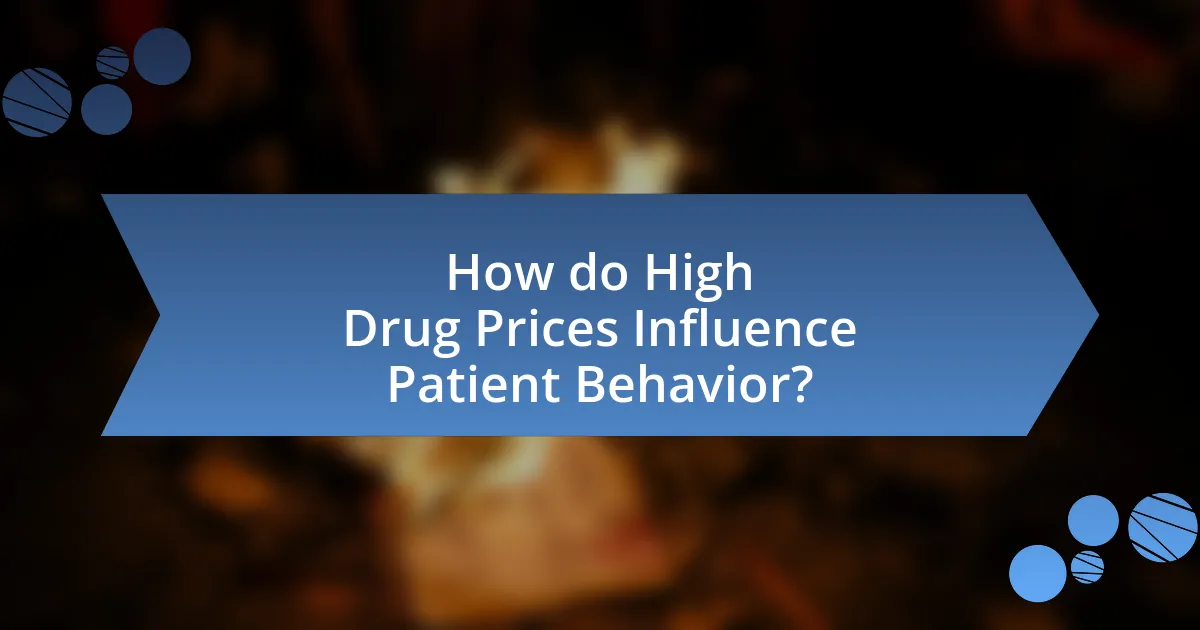
How do High Drug Prices Influence Patient Behavior?
High drug prices significantly influence patient behavior by leading to medication non-adherence and increased financial stress. Patients often forgo necessary treatments or dosages due to the high costs, which can result in worsening health outcomes. A study published in the Journal of the American Medical Association found that nearly 25% of patients reported not filling prescriptions due to cost concerns. Additionally, high prices can cause patients to delay seeking medical care, further exacerbating health issues. This behavior reflects a broader trend where financial barriers directly impact health management and overall well-being.
What choices do patients make when faced with high drug prices?
Patients faced with high drug prices often choose to forgo medication, seek alternative treatments, or request cheaper generic options. Research indicates that approximately 25% of patients report not filling prescriptions due to cost concerns, highlighting the significant impact of drug pricing on medication adherence. Additionally, many patients may turn to online resources or community programs to find financial assistance or discounts, further illustrating the lengths to which individuals will go to manage their healthcare costs effectively.
How do patients prioritize their health in light of financial constraints?
Patients prioritize their health by making difficult choices that often involve delaying or forgoing necessary medical treatments due to financial constraints. Research indicates that approximately 25% of patients report skipping medications or treatments because of cost, which directly impacts their health outcomes. For instance, a study published in the Journal of the American Medical Association found that patients who faced high out-of-pocket costs were more likely to experience worsening health conditions. This prioritization reflects a trade-off between immediate financial stability and long-term health, leading many to opt for less effective or alternative treatments that may not address their medical needs adequately.
What alternative options do patients consider when medications are unaffordable?
Patients consider several alternative options when medications are unaffordable, including seeking generic alternatives, utilizing patient assistance programs, exploring discount cards, and discussing alternative therapies with healthcare providers. Generic medications often provide a cost-effective substitute for brand-name drugs, significantly reducing expenses. Patient assistance programs, offered by pharmaceutical companies and non-profits, can provide free or low-cost medications to eligible individuals. Discount cards, available through various organizations, can also lower out-of-pocket costs at pharmacies. Additionally, patients may consult healthcare providers about alternative therapies or lifestyle changes that could mitigate the need for expensive medications. These options reflect a proactive approach to managing healthcare costs while addressing medical needs.
How do high drug prices affect adherence to prescribed treatments?
High drug prices significantly reduce adherence to prescribed treatments. When patients face high costs for medications, they are more likely to skip doses, reduce the frequency of use, or abandon treatment altogether. A study published in the Journal of the American Medical Association found that nearly 25% of patients reported not filling a prescription due to cost concerns. This financial burden creates stress and anxiety, further impacting patients’ mental health and their ability to follow treatment regimens effectively.
What factors contribute to medication non-adherence among patients?
Medication non-adherence among patients is primarily influenced by factors such as high drug prices, lack of understanding of the medication regimen, and psychological barriers. High drug prices can lead to financial strain, causing patients to skip doses or forgo medications altogether; a study published in the American Journal of Managed Care found that 29% of patients reported not filling prescriptions due to cost. Additionally, cognitive factors like forgetfulness or misunderstanding instructions can hinder adherence, as evidenced by research from the Journal of the American Medical Association, which indicated that 50% of patients do not take medications as prescribed due to confusion about their treatment plans. Psychological factors, including anxiety and depression, further exacerbate non-adherence, with studies showing that patients with mental health issues are less likely to follow medication regimens consistently.
How does the fear of financial burden impact treatment decisions?
The fear of financial burden significantly influences treatment decisions by causing patients to delay or forgo necessary medical care. This apprehension often leads individuals to prioritize cost over health outcomes, resulting in a higher likelihood of choosing less effective or alternative treatments. Research indicates that approximately 25% of patients report avoiding prescribed medications due to cost concerns, which can exacerbate health issues and lead to poorer long-term outcomes. Additionally, studies show that financial stress can lead to increased anxiety and depression, further complicating treatment adherence and decision-making.
What are the long-term consequences of behavior changes due to high drug prices?
Long-term consequences of behavior changes due to high drug prices include increased medication non-adherence, delayed treatment, and a rise in health disparities. Patients often forgo necessary medications or treatments due to affordability issues, leading to worsening health outcomes. For instance, a study published in the Journal of the American Medical Association found that nearly 25% of patients reported not filling prescriptions due to high costs, which can result in chronic disease progression and increased healthcare costs over time. Additionally, these behavior changes can exacerbate existing inequalities, as lower-income individuals are disproportionately affected by high drug prices, further widening the gap in health outcomes across different socioeconomic groups.
How do these changes affect overall health outcomes for patients?
High drug prices negatively affect overall health outcomes for patients by increasing financial stress and limiting access to necessary medications. This financial burden can lead to medication non-adherence, where patients skip doses or forgo prescriptions due to cost concerns, ultimately resulting in worsened health conditions. Studies indicate that patients who cannot afford their medications are more likely to experience adverse health events, such as hospitalizations or disease progression, which underscores the direct correlation between drug pricing and health outcomes.
What is the relationship between financial stress and chronic disease management?
Financial stress negatively impacts chronic disease management by limiting patients’ ability to afford necessary medications and healthcare services. This financial strain can lead to non-adherence to treatment regimens, resulting in worsened health outcomes. Research indicates that individuals facing financial difficulties are more likely to skip doses or forgo treatments altogether, which exacerbates their chronic conditions. A study published in the Journal of General Internal Medicine found that 29% of patients reported not filling prescriptions due to cost, highlighting the direct correlation between financial stress and compromised disease management.
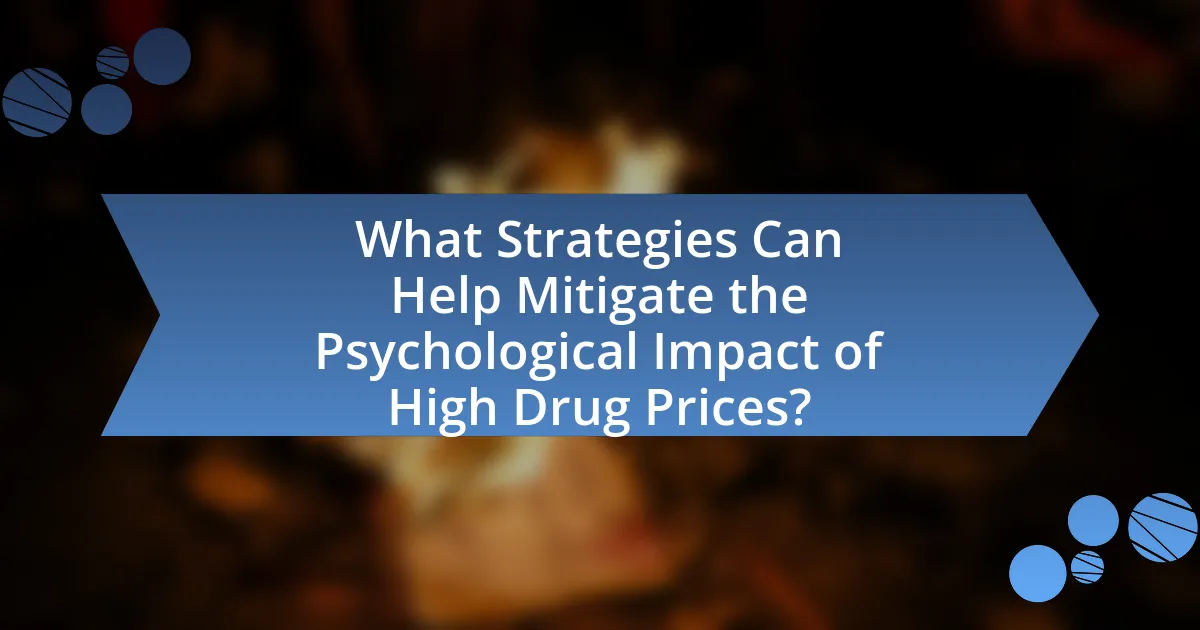
What Strategies Can Help Mitigate the Psychological Impact of High Drug Prices?
To mitigate the psychological impact of high drug prices, patients can utilize strategies such as seeking financial assistance programs, engaging in open communication with healthcare providers, and exploring generic alternatives. Financial assistance programs, often provided by pharmaceutical companies or non-profit organizations, can significantly reduce out-of-pocket costs, alleviating stress associated with affordability. Open communication with healthcare providers allows patients to discuss their financial concerns and explore alternative treatment options, fostering a supportive environment. Additionally, opting for generic medications can provide a cost-effective solution without compromising treatment efficacy, as generics are required to meet the same standards as brand-name drugs. These strategies collectively empower patients to manage the emotional burden of high drug prices effectively.
What resources are available for patients struggling with high drug costs?
Patients struggling with high drug costs can access several resources, including patient assistance programs, non-profit organizations, and government initiatives. Patient assistance programs, often provided by pharmaceutical companies, offer free or discounted medications to eligible individuals based on income and insurance status. Non-profit organizations, such as the Patient Advocate Foundation and NeedyMeds, provide information on financial assistance and help patients navigate their options. Additionally, government initiatives like Medicaid and Medicare offer coverage for certain medications, reducing out-of-pocket expenses for eligible patients. These resources collectively aim to alleviate the financial burden of high drug prices, which can significantly impact patients’ mental health and overall well-being.
How can patient assistance programs alleviate financial burdens?
Patient assistance programs alleviate financial burdens by providing free or low-cost medications to eligible patients who cannot afford them. These programs reduce out-of-pocket expenses, making essential treatments accessible and lessening the stress associated with high drug prices. For instance, a study published in the Journal of Managed Care & Specialty Pharmacy found that patient assistance programs significantly improved medication adherence among low-income patients, demonstrating their effectiveness in mitigating financial strain.
What role do healthcare providers play in supporting patients financially?
Healthcare providers play a crucial role in supporting patients financially by offering guidance on insurance options, medication assistance programs, and financial counseling. They help patients navigate complex healthcare systems to identify available resources that can alleviate the burden of high drug prices. For instance, providers often inform patients about pharmaceutical company programs that offer discounts or free medications, which can significantly reduce out-of-pocket costs. Additionally, studies indicate that when healthcare providers engage in discussions about financial concerns, patients are more likely to adhere to treatment plans, thereby improving health outcomes and reducing long-term costs associated with untreated conditions.
How can patients advocate for themselves regarding drug pricing?
Patients can advocate for themselves regarding drug pricing by actively researching medication costs, utilizing available resources, and engaging in discussions with healthcare providers. By comparing prices across pharmacies and using tools like GoodRx, patients can identify the most affordable options. Additionally, patients should inquire about generic alternatives and patient assistance programs offered by pharmaceutical companies, which can significantly reduce out-of-pocket expenses. Engaging in open conversations with healthcare providers about financial concerns can lead to tailored treatment plans that consider both medical needs and budget constraints. According to a 2021 survey by the Kaiser Family Foundation, 29% of Americans reported not filling a prescription due to cost, highlighting the importance of patient advocacy in addressing drug pricing issues.
What strategies can patients use to communicate with healthcare professionals about costs?
Patients can effectively communicate with healthcare professionals about costs by preparing specific questions regarding pricing and insurance coverage before appointments. This preparation allows patients to address financial concerns directly and ensures they receive clear information about the costs associated with their treatment options. Research indicates that patients who engage in open discussions about costs are more likely to understand their financial responsibilities and make informed decisions about their care. For instance, a study published in the Journal of Health Economics found that transparent communication about costs can lead to better patient satisfaction and adherence to treatment plans.
How can patients leverage community resources to manage drug expenses?
Patients can leverage community resources to manage drug expenses by accessing local assistance programs, non-profit organizations, and community health clinics that provide financial aid or discounted medications. These resources often include programs like the Partnership for Prescription Assistance, which connects patients with pharmaceutical companies offering free or low-cost medications based on income eligibility. Additionally, community health clinics frequently have sliding scale fees based on income, allowing patients to receive necessary prescriptions at reduced costs. According to the National Association of Community Health Centers, these clinics serve over 30 million patients annually, highlighting their significant role in providing affordable healthcare options.
What practical tips can help patients cope with the psychological effects of high drug prices?
Patients can cope with the psychological effects of high drug prices by employing several practical strategies. First, they should seek financial assistance programs offered by pharmaceutical companies, non-profits, or government agencies, which can alleviate the burden of costs. Second, patients can engage in open discussions with healthcare providers about alternative medications or treatment options that may be more affordable, ensuring they remain informed about their choices. Third, joining support groups can provide emotional support and shared experiences, helping patients feel less isolated in their struggles. Lastly, practicing stress-reduction techniques such as mindfulness or cognitive behavioral therapy can help manage anxiety related to financial stress. These strategies are supported by research indicating that social support and coping mechanisms can significantly reduce psychological distress in patients facing financial hardships.
How can mindfulness and stress-reduction techniques assist patients?
Mindfulness and stress-reduction techniques assist patients by enhancing emotional regulation and reducing anxiety, which can be particularly beneficial in coping with the psychological stress associated with high drug prices. Research indicates that mindfulness practices, such as meditation and deep-breathing exercises, can lower cortisol levels, thereby alleviating stress and improving overall mental health. A study published in the Journal of Health Psychology found that participants who engaged in mindfulness-based stress reduction reported significant decreases in anxiety and depression symptoms, demonstrating the effectiveness of these techniques in managing stress. By fostering a greater sense of awareness and presence, mindfulness helps patients navigate the emotional challenges posed by financial burdens related to medication costs.
What support networks are beneficial for patients facing high drug prices?
Support networks that are beneficial for patients facing high drug prices include patient advocacy organizations, community health programs, and online support groups. Patient advocacy organizations, such as the Patient Advocate Foundation, provide resources and assistance in navigating drug pricing and access issues. Community health programs often offer financial assistance and education on available options for reducing medication costs. Online support groups, like those found on platforms such as PatientsLikeMe, allow individuals to share experiences and strategies for coping with high drug prices, fostering a sense of community and emotional support. These networks collectively help patients manage the psychological stress associated with financial burdens from medication costs.
